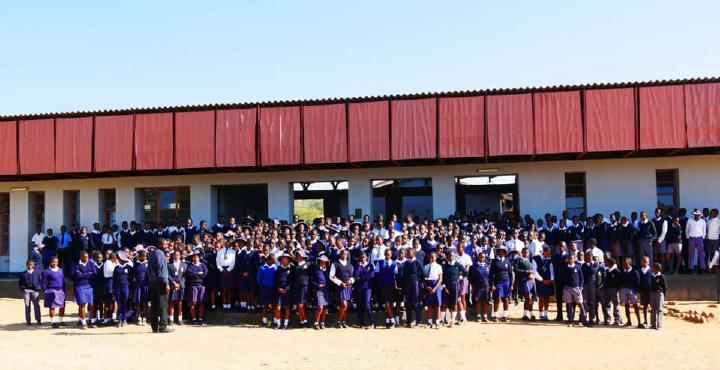is essentially asymmetric due to the unequal positions of the actors, which allows for abuses of power. Corrupt practices tend to benefit those who have sources of relationships that allow them to obtain benefits through nepotism. Because of the secrecy surrounding such practices, contamination is widespread. Corruption expands through the perversion of the system itself. Towards Eradicating Corruption For the possible eradication of corruption Bayle (1970) suggests that a policy be adopted to contain the grossest forms of corruption while waiting for changes in circumstances to remove the functional utility of such practices. This is an essentially passive strategy influenced by the belief that corruption will not have harmful consequences that hinder progress. Corruption can be eradicated by exhorting and reviving solid morals. Hence the need for the acceptance of the common good as the end of the particular persons that exist in the community, as the end of everything and the end of any of its parts (Gandra, 2000). In other words, the good of the community is the good of the individuals who make it up. The individual desires the good of the community insofar as he represents his own good. Thus, the good of others is not strange to the good itself. Ignorance of the common good as the primary particular good is a neglect of the dignity of the
human person, since human dignity is not a particular good, but a common good inherent in all men. This means that human dignity is a proper good of each and every person that makes part of society. That is why totalitarian political forms involve the denial of the common good by undermining the dignity of the human person. The understanding of the common good as the basic requirements for decent human life requires personal responsibility. This implies the maturation of the individual who is capable of recognizing one’s own mistakes in order to deal with one’s immaturity so as to create opportunities for personal and professional growth. The lack of a sense of the common good as a principle for upholding the dignity of the human person and personal responsibility in public affairs generates nepotism as well as clientelism, which comes into play. The other sequel to corruption that is most prevalent mainly in African societies is tribalism. It involves the exclusion or marginalisation of those who do not belong to one’s tribe or ethnic group. It is the instrumentalization or manipulation of ethnic identities in order to derive certain benefits (Coulon, 1997). Tribalism is evidently a phenomenon that seriously affects African societies. Through the tendency to over-value and give priority to one’s family, tribe, neighborhood, or village, tribalism blindly leads the continent to disaster. This attitude causes a person to devalue Mukai - Vukani No.76 | April 2020 |
or ignore the good effort or contribution made by someone who does not belong to one’s group of preference. If Africa is to firmly establish itself on the path of development, the psychological work of cleaning the African mind of nepotism, tribalism and corruption must be enhanced. To this end, family and school based education needs to play an effective role in the promotion of morals against corruption. If education does not play its proper role as a driving force for social change, development will continue to be a postponed dream for Africa. Conclusion In conclusion, we can categorically affirm that corruption is an evil that affects the whole of society. It affects the provision of public services as well as the social and economic development of many countries in the world, particularly in Africa. It erodes the dignity of citizens, deteriorates social life and compromises the lives of the present and future generations. The fight against corruption requires a cultural and behavioral revolution for all citizens, because societal change depends on the development of individuals that compose it. So working against corruption in isolation is ineffective. One of the main weapons in the battle against corruption is education. Only with the formation of conscientious citizens committed to ethics, morals, citizenship and honesty, can we build societies free from corruption. 18
The Great Adversary of Any Economy John Saviour Tuyishimire
The fundamental questions that
each and every economy seeks to solve is what, how and for whom to produce, these are recognized as being critical in any economy. They are then answered in an environment of scarce resources which unfortunately, should be allocated to the unlimited human wants and needs. Hence, the need for households, firms and governments to work together in trying to answer these questions. The problem of scarce resources results in economic agents making choices, which means some alternative has to be forgone while others are preferred. Economics is, therefore, a social science concerned with combating the fundamental economic problem of scarcity in the condition of unlimited human needs and wants of different society players. The type of economic system determines how resources are allocated to satisfy the needs and wants. There are basically four types of economic systems, namely, the traditional economy, free market economy, command economy and mixed economy. The traditional economic system is the most traditional and ancient types of economies in the world. Each member of a traditional economy has a more specific and pronounced role, and these societies tend to be very close-knit and socially satisfied. In a command economic system, a large part of the economic system is
controlled by a centralized power. In a free-market economy, firms and households act in self-interest to determine how resources are allocated, what goods get produced and who buys the goods. However, no truly free market economy exists in the world. A mixed economy is a combination of different types of economic systems. Most economies of the world, including Zimbabwe’s, are mixed where the invisible hand of the market (forces of demand and supply) and the government play a role.
expected way of doing business especially in the public sector. If a civil servant still goes to work today it is not because of the salary but the opportunities to enhance his or her paltry income with corrupt acts using the organization’s resources” Tizor (2009).
The statement above makes it clear that corruption has become the order of the day in Zimbabwe and this has been worsened by the harsh economic environment that has bedevilled the economy in recent times. For an economy to function properly, the government Most economies have, in recent has to play an important role to times, been riddled with a modern make sure that the economic funeconomic problem of corruption. damental questions are answered Even the Bible referred to it as in an effective and efficient way. a great sin: “You shall not take Below, we briefly explain some a bribe, for a bribe blinds the of the roles and how failure by clear-sighted and subverts the government to play these roles has cause of the just.” (Exodus 23:8) made corruption thrive. It has been regarded by many as an economy’s great adversary due Regulation to the damage it causes to the The regulatory role of governtotal functioning of the economy. ment involves regulation of Corruption has affected how the various businesses and economic fundamental economic questions activities by directing the busiare answered in different econnesses with sets of controls. As omies. Corruption has risen to such, failure by government to unprecedented levels in Zimbaregulate economic activity may bwe, as according to Transparen- result in some businesses and cy International (TI), Zimbabwe is individuals taking advantage of ranked 158/180 countries using the loopholes and involving themthe Corruption Perceptions Index selves in corrupt activities like 2019. bribery, money laundering, and tax evasion among others. “With the Zimbabwean economy in the doldrums, corruption has Distribution become an accepted and almost Resources should be distributed Mukai - Vukani No.76 | April 2020 |
19









